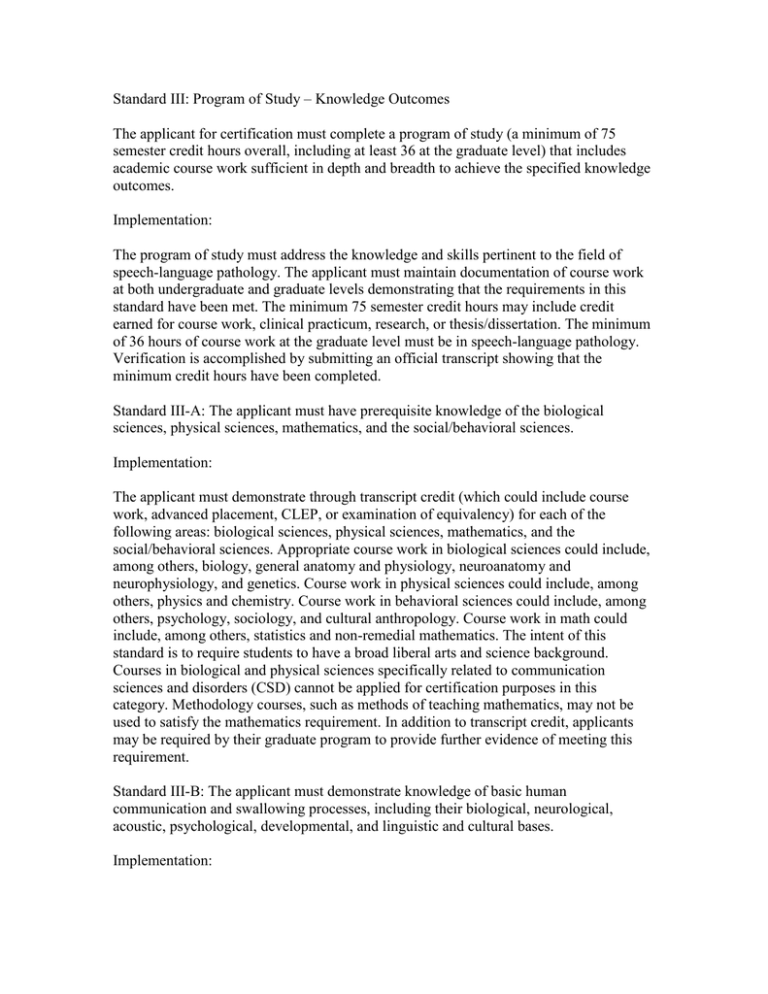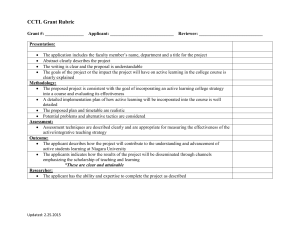Standard III: Program of Study – Knowledge Outcomes
advertisement

Standard III: Program of Study – Knowledge Outcomes The applicant for certification must complete a program of study (a minimum of 75 semester credit hours overall, including at least 36 at the graduate level) that includes academic course work sufficient in depth and breadth to achieve the specified knowledge outcomes. Implementation: The program of study must address the knowledge and skills pertinent to the field of speech-language pathology. The applicant must maintain documentation of course work at both undergraduate and graduate levels demonstrating that the requirements in this standard have been met. The minimum 75 semester credit hours may include credit earned for course work, clinical practicum, research, or thesis/dissertation. The minimum of 36 hours of course work at the graduate level must be in speech-language pathology. Verification is accomplished by submitting an official transcript showing that the minimum credit hours have been completed. Standard III-A: The applicant must have prerequisite knowledge of the biological sciences, physical sciences, mathematics, and the social/behavioral sciences. Implementation: The applicant must demonstrate through transcript credit (which could include course work, advanced placement, CLEP, or examination of equivalency) for each of the following areas: biological sciences, physical sciences, mathematics, and the social/behavioral sciences. Appropriate course work in biological sciences could include, among others, biology, general anatomy and physiology, neuroanatomy and neurophysiology, and genetics. Course work in physical sciences could include, among others, physics and chemistry. Course work in behavioral sciences could include, among others, psychology, sociology, and cultural anthropology. Course work in math could include, among others, statistics and non-remedial mathematics. The intent of this standard is to require students to have a broad liberal arts and science background. Courses in biological and physical sciences specifically related to communication sciences and disorders (CSD) cannot be applied for certification purposes in this category. Methodology courses, such as methods of teaching mathematics, may not be used to satisfy the mathematics requirement. In addition to transcript credit, applicants may be required by their graduate program to provide further evidence of meeting this requirement. Standard III-B: The applicant must demonstrate knowledge of basic human communication and swallowing processes, including their biological, neurological, acoustic, psychological, developmental, and linguistic and cultural bases. Implementation: This standard emphasizes the basic human communication processes. The applicant must demonstrate the ability to integrate information pertaining to normal and abnormal human development across the life span, including basic communication processes and the impact of cultural and linguistic diversity on communication. Similar knowledge must also be obtained in swallowing processes and new emerging areas of practice. Program documentation may include transcript credit and information obtained by the applicant through clinical experiences, independent studies, and research projects. Standard III-C: The applicant must demonstrate knowledge of the nature of speech, language, hearing, and communication disorders and differences and swallowing disorders, including the etiologies, characteristics, anatomical/physiological, acoustic, psychological, developmental, and linguistic and cultural correlates. Specific knowledge must be demonstrated in the following areas: * articulation * fluency * voice and resonance, including respiration and phonation * receptive and expressive language (phonology, morphology, syntax, semantics, and pragmatics) in speaking, listening, reading, writing, and manual modalities * hearing, including the impact on speech and language * swallowing (oral, pharyngeal, esophageal, and related functions, including oral function for feeding; orofacial myofunction) * cognitive aspects of communication (attention, memory, sequencing, problemsolving, executive functioning) * social aspects of communication (including challenging behavior, ineffective social skills, lack of communication opportunities) * communication modalities (including oral, manual, augmentative, and alternative communication techniques and assistive technologies) Implementation: The applicant must demonstrate the ability to integrate information delineated in this standard. Program documentation may include transcript credit and information obtained by the applicant through clinical experiences, independent studies, and research projects. It is expected that course work addressing the professional knowledge specified in Standard III-C will occur primarily at the graduate level. The knowledge gained from the graduate program should include an effective balance between traditional parameters of communication (articulation/phonology, voice, fluency, language, and hearing) and additional recognized and emerging areas of practice (e.g., swallowing, upper aerodigestive functions). Standard III-D: The applicant must possess knowledge of the principles and methods of prevention, assessment, and intervention for people with communication and swallowing disorders, including consideration of anatomical/physiological, psychological, developmental, and linguistic and cultural correlates of the disorders. Implementation: The applicant must demonstrate the ability to integrate information about prevention, assessment, and intervention over the range of differences and disorders specified in Standard III-C above. Program documentation may include transcript credit and information obtained by the applicant through clinical experiences, independent studies, and research projects. Standard III-E: The applicant must demonstrate knowledge of standards of ethical conduct. Implementation: The applicant must demonstrate knowledge of, appreciation for, and ability to interpret the ASHA Code of Ethics. Program documentation must reflect course work, workshop participation, instructional module, clinical experiences, and independent projects. Standard III-F: The applicant must demonstrate knowledge of processes used in research and the integration of research principles into evidence-based clinical practice. Implementation: The applicant must demonstrate comprehension of the principles of basic and applied research and research design. In addition, the applicant should know how to access sources of research information and have experience relating research to clinical practice. Program documentation could include information obtained through class projects, clinical experiences, independent studies, and research projects. Standard III-G: The applicant must demonstrate knowledge of contemporary professional issues. Implementation: The applicant must demonstrate knowledge of professional issues that affect speechlanguage pathology as a profession. Issues typically include professional practice, academic program accreditation standards, ASHA practice policies and guidelines, and reimbursement procedures. Documentation could include information obtained through clinical experiences, workshops, and independent studies. Standard III-H: The applicant must demonstrate knowledge about certification, specialty recognition, licensure, and other relevant professional credentials. Implementation: The applicant must demonstrate knowledge of state and federal regulations and policies related to the practice of speech-language pathology and credentials for professional practice. Documentation could include course modules and instructional workshops. Return to Top Standard IV: Program of Study—Skills Outcomes Standard IV-A: The applicant must complete a curriculum of academic and clinical education that follows an appropriate sequence of learning sufficient to achieve the skills outcomes in Standard IV-G. Implementation: The applicant's program of study should follow a systematic knowledge- and skillbuilding sequence in which basic course work and practicum precede, insofar as possible, more advanced course work and practicum. Standard IV-B: The applicant must possess skill in oral and written or other forms of communication sufficient for entry into professional practice. Implementation: The applicant must demonstrate communication skills sufficient to achieve effective clinical and professional interaction with clients/patients and relevant others. For oral communication, the applicant must demonstrate speech and language skills in English, which, at a minimum are consistent with ASHA's most current position statement on students and professionals who speak English with accents and nonstandard dialects. For written communication, the applicant must be able to write and comprehend technical reports, diagnostic and treatment reports, treatment plans, and professional correspondence. Individuals educated in foreign countries must meet the criteria required by the International Commission of Healthcare Professionals (ICHP) in order to meet this standard.

